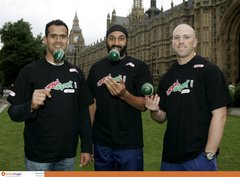
I must take this opportunity to thank the South African cricket team. By beating England in Barbados they put a stop to my blind belief that England would reach the Semi-Finals. England have done nothing to show that they would make the final stages but being an England supporter there is always a thought they they could produce something from nothing. Now they are out I can relax and enjoy the competiton, but what will be the fallout from another poor English World Cup?
Tom Moody is the man that the majority of pundits, ex-players and supporters are talking about as the man to replace Duncan Fletcher.
This however is a concern. It seems that over the last few years whenever those in the know have suggested changes of personnel within the England camp it has never materialised. So with that in mind Moody can rest easy in his role with Sri Lanka, safe in the knowledge that the ECB will probably not want to go with the crowd.
Debate over the makeup of the England One Day squad faded away as Vaughan (and Team) was booed unanimously by the large England contingent at the Kensington Oval. The reaction of the crowd says it all. Supporters who have sung their hearts out at the most embarrassing performances finally lost their belief. Indeed the Barmy Army got their name from a commentator who coined the phrase after seeing hundreds of fans singing their support during another England Ashes collapse. For England fans to boo this England side just shows how far the relationship between the team and the fans has nose-dived.
Surely whatever the outcome of this tournament there are a few issues that do need to be debated by those in control.
1. Have central contracts worked to progress the standard of English One Day cricket?
2. Is the current setup for finding and improving new England players correct?
3. Why is it so difficult for prominent Ex-English players to be involved in the management of English cricket?
David Beckham resigned as England Captain after a poor World Cup, but he did not retire from football entirely. He showed that, despite his wealth and popularity, he was realistic enough to know that a change was necessary. Michael Vaughan, having showed terrible batting form and inconsistent captaincy during this competition, has neither resigned nor retired from One Day cricket. This just epitomizes the attitude that has been allowed to mature in the team.
This however is a concern. It seems that over the last few years whenever those in the know have suggested changes of personnel within the England camp it has never materialised. So with that in mind Moody can rest easy in his role with Sri Lanka, safe in the knowledge that the ECB will probably not want to go with the crowd.
Debate over the makeup of the England One Day squad faded away as Vaughan (and Team) was booed unanimously by the large England contingent at the Kensington Oval. The reaction of the crowd says it all. Supporters who have sung their hearts out at the most embarrassing performances finally lost their belief. Indeed the Barmy Army got their name from a commentator who coined the phrase after seeing hundreds of fans singing their support during another England Ashes collapse. For England fans to boo this England side just shows how far the relationship between the team and the fans has nose-dived.
Surely whatever the outcome of this tournament there are a few issues that do need to be debated by those in control.
1. Have central contracts worked to progress the standard of English One Day cricket?
2. Is the current setup for finding and improving new England players correct?
3. Why is it so difficult for prominent Ex-English players to be involved in the management of English cricket?
David Beckham resigned as England Captain after a poor World Cup, but he did not retire from football entirely. He showed that, despite his wealth and popularity, he was realistic enough to know that a change was necessary. Michael Vaughan, having showed terrible batting form and inconsistent captaincy during this competition, has neither resigned nor retired from One Day cricket. This just epitomizes the attitude that has been allowed to mature in the team.





